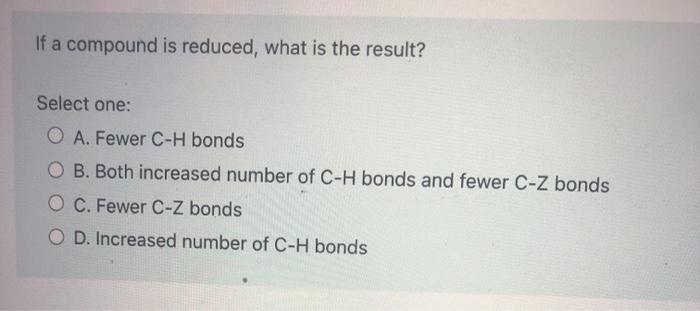QQuestionAnatomy and Physiology
QuestionAnatomy and Physiology
If a compound is reduced, what is the result?
Select one:
A. Fewer C-H bonds
B. Both increased number of C-H bonds and fewer C-Z bonds
C. Fewer C-Z bonds
D. Increased number of C-H bonds
Attachments

6 months agoReport content
Answer
Full Solution Locked
Sign in to view the complete step-by-step solution and unlock all study resources.
Step 1: Understand the problem and identify the key concepts
The problem asks about a compound being reduced. In chemistry, a reduction reaction is characterized by a gain of electrons or a decrease in oxidation state. When a compound undergoes reduction, the number of bonds between certain atoms may change. In this case, we are looking at a compound containing carbon (C), hydrogen (H), and another atom Z. The question asks about the change in the number of C-H and C-Z bonds due to reduction.
Step 2: Analyze the effects of reduction on C-H and C-Z bonds
When a compound containing carbon is reduced, the oxidation state of carbon decreases. This decrease in oxidation state can be achieved by gaining electrons or by forming more bonds with elements having lower electronegativity than carbon, such as hydrogen. As a result, the number of C-H bonds may increase due to the reduction of the compound. On the other hand, the number of C-Z bonds, where Z is an atom with higher electronegativity than carbon, is likely to decrease because carbon tends to share electrons with elements having lower electronegativity.
Final Answer
The result of reducing a compound is fewer C-Z bonds, where Z is an atom with higher electronegativity than carbon.
Need Help with Homework?
Stuck on a difficult problem? We've got you covered:
- Post your question or upload an image
- Get instant step-by-step solutions
- Learn from our AI and community of students